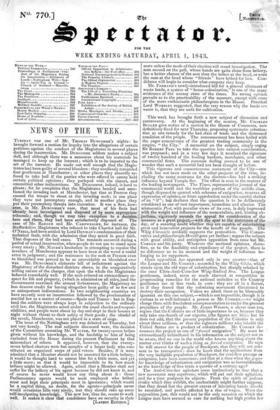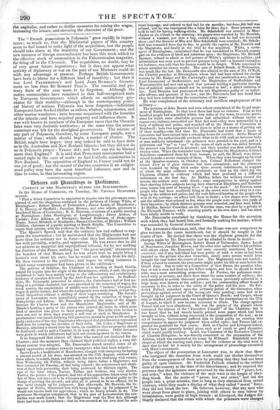This week has brought forth a new subject of discussion
and controversy. At the beginning of the session, Mr. CHARLES BULLER gave notice of a motion in the House of Commons, now definitively fixed for next Thursday, proposing systematic coloniza- tion as one remedy for the bad state of trade and the distressed condition of the people. The announcement has been hailed with the eager concurrence of the greatest trading community in the empire, "the City." A memorial on the subject, simply urging Sir ROBERT PEEL to take the question into earnest consideration, was proposed ; and in a very few days it received the signature of twelve hundred of the leading bankers, merchants, and other commercial firms. The common feeling seemed to be one of wonder that such a memorial had not been thought of before.
This vigorous and consentaneous movement of the City—one which has not been made on the other projects of the time, in- cluding the many nostrums for the distress—has had a striking influence beyond Temple Bar. The effect is seen in the manner of the leading newspapers. The Times, representative journal of the commercial world and the wealthier portion of the middle class, though disposed to quarrel with schemes of emigration, reserves all expression of opinioo, or hints approbation under the careful shelter of an " if" ; lint declares that the question is to be deliberately considered as one of vast importance, immediate and ulterior. The aristocratic Post, with peculiar views of its own, is duly impressed with the weight and influence of the memorialists, and, hinting ob- jections, vigorobsly seconds the appeal for consideration of the measure as a great project,—with the spur to the statesmen of the day, of a sneering doubt whether they are capable of entertaining great and benevolent projects for the benefit of the people. The Whig Chronicle cordially supports the proposition. The Conser- vative and philanthropic Herald goes yet further ; argues the subject with great ability, and anticipates opposition from none but Mr. COBDEN and his party. Whatever the sectional opinions, there- fore, as to the feasibility and expediency of the project, there is no difference as to its moment and the weight of influence be- longing to its supporters. Open opposition has appeared only in one quarter—that of the League and Mr. COBDEN; seconded by the Whig Globe, which stands upon the old ways of colonization, but sharply rebuked by the once Ultra-Anti-Corn-law Whig-Radical Sun. The League gentlemen, indeed, seem as much alarmed at competition in propounding remedies for the national maladies as the Country gentlemen are at free trade in corn : they are all in a flutter, as if they feared that the colonizing movement threatened to destroy their occupation. Unless we admit them to be blameably ignorant on this one subject,—which is not impossible, though it is curious in so well-informed a person as Mr. COBDEN,—we might charge them with fraudulent misrepresentation to excite the grossest prejudices of the people. Mr. JAMES 'WILSON, a clever man too, argues that the Colonies are of little importance to us, because they only take one-fourth of our exports, (the figures are his); but he does not add, that the present population of the Colonies is only about three millions, or that the eighteen millions who inhabit the United States are a product of colonization. Mr. COBDEN de- nounces the project as one of "forced emigration"! He must be '
extraordinarily behindhand in his information on the subject not to be aware, that no one in the world who knows anything about the
matter ever thinks of such a thing as forced emigration. He says
he will answer for the people of Stockport, that they will not con- sent to be transported : does he know that the applications from
the very ineligible population of Stockport, for cost-free passage as emigrants, have been numerous ; and that at a time when the popu- lar knowledge of colonization and emigration was as inconsiderable as the knowledge of free trade a quarter of a century ago ?
The Anti-Corn-law agitators seem instinctively to fear that a new movement may supervene, which will put out their agitation, and for a time postpone its objects. From the spirit of jealous rivalry which they exhibit, the uncharitable might further suppose, that they dread lest the present excess of labouring hands should be remedied, and profits affected by a rise of wages. Were the supposition just, this would not be the only occasion on which the League men have seemed to care for nothing but high profits for
the capitalist, and rather to dislike measures for raising the wages, increasing the leisure, and elevating the character of the poor.



























